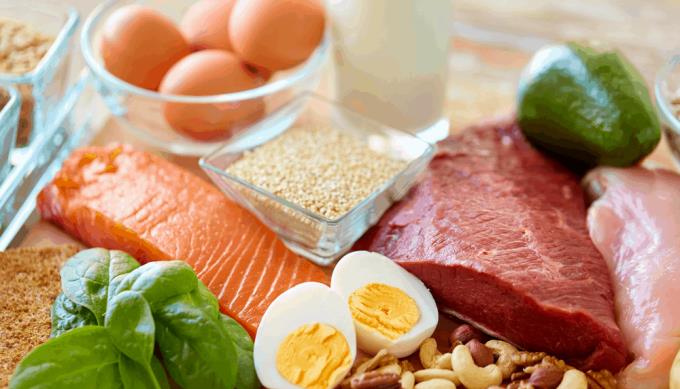Nutrition menu for 2-month pregnant women is quite diverse, including fresh vegetables, meat and fruits to provide enough minerals for the body.
During pregnancy, pregnant mothers have a varied menu that will provide the baby with all the necessary nutrients to support proper growth and development. A healthy 2-month pregnancy diet will also help you stay fit and active during this critical period. Therefore, pregnant mothers need to learn about what should or should not eat to keep the baby and yourself safe.
Recommended nutritional intake for pregnant women for 2 months
The following information sheet will help pregnant women in 2 months know what to add in their daily diet:
Nutrients Recommended Nutrients (RDA)
Calcium1000mg
Iron27mg
Vitamin C85mg
Vitamin D600 IU
Folic acid600µg
Vitamin B121.9mg
Protein60gm
Iodine150µg
Food 2 months pregnant women should eat
Here are the essential foods that you should include in your second month of pregnancy:
1. Calcium-rich foods
Calcium is an important nutrient during pregnancy for the healthy development of fetal bones, teeth and muscles. This mineral is also essential for the heart and nerves. Calcium-rich foods include:
Milk
Tofu
Cheese
Nuts
Yogurt
Broccoli.
2. Foods rich in folic acid
Folic acid is essential to prevent neural tube defects in children and also helps in blood formation. Folic acid foods that pregnant women can eat for 2 months are:
Whole-wheat bread
Green leafy vegetables
Pea's tree
Orange juice
Cereals
Avocado.
3. Iron rich foods
Iron is an essential mineral that helps to improve the concentration of hemoglobin to bring the necessary amount of blood to the placenta and fetus as well as avoid iron deficiency anemia . Iron-rich foods that you can consider include:
Clam
Bean
The pasta
Beef
Cereals
Lean
Bread
Nuts
Drying fruits
Green leafy vegetables
4. Fiber-rich foods
Pregnant women 2 months at risk of constipation during pregnancy . However, foods rich in fiber will help treat this condition. These include:
Whole-grain bread
Pea's tree
Oat
Fruit
Vegetable
5. Iodine-rich foods
Iodine is on the list of minerals essential for fetal brain and nerve development. Foods rich in iodine include:
Milk
Fish
Cheese
Yogurt
Bread and cereals
Salt with iodine supplement.
6. Protein-rich foods

During pregnancy, pregnant mothers need a source of healthy protein to provide the body with enough energy to help the baby develop tissue. In addition, protein will also assist you in repairing tissues in the muscles and chest. High-protein foods recommended for you include:
Fish
Egg
Lean
Milk Products
Nuts
Assorted nuts good for pregnant women , such as pumpkin seeds, sunflower seeds.
7. Foods rich in vitamin B12
Vitamin B12 is important for maintaining the health of the nervous system. Many experts believe that when combined with folic acid, B12 can help the fetus prevent spina bifida and birth defects in the central nervous system. Some of the foods rich in vitamin B12 are:
Fish
Meat
Egg
Poultry
Milk and dairy products.
8. Foods rich in vitamin D
Vitamin D is present in the list of essential minerals for pregnant women in 2 months with the task of supporting healthy bone development. Also, if you have a vitamin D deficiency, pregnant women are at risk for pre-eclampsia . Besides functional foods, some vitamin D rich foods for pregnant mothers include:
Milk fortified with vitamin D
Cereals
Tuna
Mackerel
Salmon
Egg
Mushroom.
9. Foods rich in vitamin C
Two-month pregnant women need vitamin C to strengthen the immune system as well as support their baby in developing bones and teeth. Vitamin C will be present in the following foods:
Yellow and red bell peppers
Cabbage
Broccoli
Strawberry
Citrus fruits.
Food 2 months pregnant should not eat
In addition to healthy foods, pregnant mothers should also pay attention to bad foods, such as:
Raw eggs: Consuming raw eggs can contaminate salmonella, negatively affecting you and severely hindering your baby's normal development. Therefore, when enjoying eggs, cook them completely instead of just blanching.
Processed meat: Many processed meat products contain the risk of preservatives or infections, harming the health of pregnant women as well as babies in the abdomen. Therefore, experts advise pregnant women 2 months to "be careful not to be" by limiting the consumption of industrially processed meats.
Raw fish: Sushi and raw fish salads are delicious, but not suitable for pregnant women. You should consider and temporarily leave the above dishes to ensure the health of mothers and babies.
Unpasteurized Milk: Pregnant women should not drink unpasteurized milk to minimize the risk of poisoning by microorganisms, pathogens and salmonella that are harmful to your body and the development of your baby.
Through the above sharing, aFamilyToday Health believes that pregnant mothers know how to choose the best foods to ensure their own and their baby's nutritional needs. Wish you have a good pregnancy.












